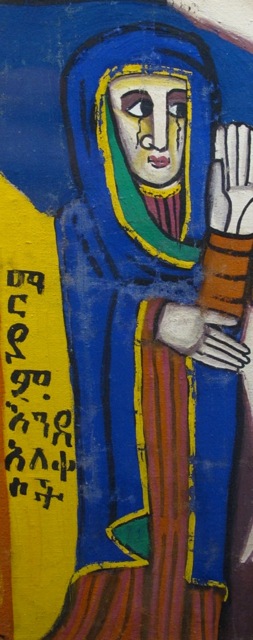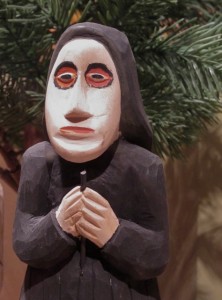by Robin Sierra
Published in Western North Carolina Woman
 After being married for ten years, my friend Summer realized she had lost herself somewhere along the way. Without noticing, a voice inside her she calls the the “Antique Woman” had begun dominating her thoughts.
After being married for ten years, my friend Summer realized she had lost herself somewhere along the way. Without noticing, a voice inside her she calls the the “Antique Woman” had begun dominating her thoughts.
Summer’s Antique Woman doesn’t believe in her own autonomy or power. She clings to a fantasy of how relationships should or could be rather than coming to terms with how they really are. She keeps the truth hidden, even from herself. She clutches to relatedness when the relationship is no longer working and gives herself away in order to keep a marriage intact. Summer loved being a part of a family and being a mother, but she consistently put her husband’s needs before her own, and denied her instincts which, in the form of intuitions and dreams of her husband’s infidelity, told her that her marriage was in trouble.
Nonetheless, she ignored these signs, She was not willing or ready to face what it would mean to let go of her marriage—becoming a single parent, sleeping alone, the pain of separation, loneliness, letting go of the idea of family, feeling like a failure. The consequence of suppressing these instincts was that she doubted her instincts in general. She began to wonder, “Where have I gone? Where am I?”
It was the artist in her that led her back to remembering who she was.
Throughout her life Summer felt like an artist without an art-form. She would often reach into the air, wriggling her fingers, kneading the sky, trying to fulfill an unknown longing. In her twenties, her “vagabond days”, she baked bread. She loved plunging her hands into the soft, warm dough. She loved the sensuality of kneading and punching, of working the muscles in her arms and back. But years later, in the midst of the disquiet of her relationship, a neighbor offered a clay class. When she put her hands in the mud of the earth, Summer knew she had found what she was yearning for. Soon after she started making sculptures, she felt a sense of familiarity, as if she already knew how to sculpt. She received positive responses from others right from the beginning, but praise wasn’t important. For the first time in her life, approval and disapproval were irrelevant, because the “making” itself was so fulfilling.
As her work progressed, something unexpected began to emerge. She had done a sculpture from an eighty year old model, a woman with a “kind and wise countenance,” and when the piece was nearly finished Summer brought it home and would move it to different spots around the house. It wasn’t long before she noticed that she had begun talking to the sculpture, sharing her musings and personal dilemmas, and soon the sculpture began speaking to her! This wasn’t delusion. Summer had a playful nature, and as a child she was often accused of having an overactive imagination. She knew it was her own voice projected out to the clay figure, a lost part of herself that needed to be heard.
As Summer continued this unusual dialogue, the old woman told her to keep working on her, and gave her specific instructions. She was now directed to carefully scrape off the old woman’s hair, to hollow out the inside of her head, to slice off the neck, and finally to lay the head face-up in a sculpted bowl. When Summer was finished, the figure had been transformed. She was now bald, and because the head was hollow there was a darkness and depth through the portals of her eyes. Instead of a kindly, older woman, she was now a powerful crone. Summer was witnessing a part of herself becoming visible. Her husband was so disturbed by the sculpture that he asked Summer to throw a cloth over the head, but women friends who came by to visit were intrigued and strengthened by her.
The same thing continued with every sculpture she made from then on. They all “spoke” to her. Summer was now committed to following wherever each sculpture would lead, no matter how unreasonable it seemed. If she ruined it in the process, so be it. She stopped asking other people for their opinions, and began to trust her own instincts once again. If she heard one of the sculptures speaking to her, she wouldn’t question whether the directive was right or wrong, only whether it felt right, she would follow it. If the figure beckoned her to cut off its arms, she did. If it asked her to place a crown embellished with suns and moons, birds and snakes on its head, she did. If it asked her to lop off its feet, even when she had spent days painstakingly crafting each toe, she did. If a male figure told her to carve a hidden womb in his belly, she did. It was an adventurous experiment and as she proceeded, she found that the directives were invariably “right”. Each sculpture revealed a forgotten part of herself. She began to refer to this creative impulse as her “Do This Now Voice.”
By listening to her “Do This Now Voice,” Summer gradually began to realize that she could no longer hold on to her illusions about her marriage. As the truth of her husband’s infidelity emerged and their marriage began to unravel, with it came tremendous pain and chaos. Summer felt directionless, jangled and close to madness. The dreams of her life seemed shattered.
What was previously masked by the strained and smiling face of the Antique Woman, by her desperation to keep things together, was now revealed. What had been buried was exhumed. Summer was willing to work with whatever emotions came up. She had been lost for too long and she knew that if she sincerely wanted to come all the way home, she had to be willing to experience the pain of what she had denied.
Summer was called into the underworld, and she followed.
For two years after she and her husband separated, Summer wore black clothes. She didn’t mask her anguish and restlessness by watching television, reading mystery novels or schmoozing at the local cafe. She fought against a powerful urge to keep herself busy when she felt sad or depressed. Trying to fix what appeared to be broken, to “lighten up” and “get over it” wouldn’t work. She had to live through the unremembered wounds of a lifetime that were triggered by the (eventual) divorce. What has been restrained cried out to be seen and heard.
Summer called this her “composting” period. Compost is garbage: wilted cabbage and flowers, squashed plums, moldy bread, tea bags, dead leaves and dirt, all piled together and decaying. Eventually, with time, moisture, air, and worms, this mound of cast off stuff transforms into a rich nurturing substance. “I was an accidental seed that was buried in the compost and it was only a matter of time before I was going to sprout. I knew that eventually something would grow, but that it would take time. I trusted myself enough now to know what I needed to do, regardless of what anyone else thought.” And what she most needed to do was not to do anything, to lie fallow, to feel what she felt.
We must be willing to compost our grief, loss and powerlessness. Slyvia Perera, author of Descent to the Goddess, says that there are times when we are “suspended out of life.” There is no rushing this process. It must happen in its own timing. We don’t know where such experiences will take us, or how long they will last, but some part of us knows that we must go down deeply before we can come up again. We feel compelled to demolish the illusions of who we thought we were, to let the obsolete vision die, so that a more honest one can arise. If we have the intention, courage and stamina, the heat of the compost will eventually burn out what is false.
Summer allowed herself to compost for several years, despite the fear that she would dive so deeply that she would never resurface. Instead, she found in herself a strength and fierceness she didn’t know she possessed, as well as the ability to bear the unbearable. She no longer had to strain to keep hidden the parts of herself that she feared. She was no longer afraid of uncovering the truth, feeling her pain, and speaking her mind. A sense of deep relief welled up in her, and she knew that the errant seed had taken root.
Summer’s home is now bursting with clay figures that she is in continual dialogue with, that teach and empower her. This is her unearthed chorus of voices, parts of herself made visible, parts that make up the whole of who she is. Among them is the Crone who speaks to her of the deepest truths, the Hermit who shows her the secrets of the cave, and the Hag who emboldens her to be funny and bawdy. There is even a place for the Antique Woman.


THANKYOU. THANKYOU! THANK YOU! Thank you for sharing. Love and gratitude for Summer and her brave journey back to herself. Her courageous path smooths the way for others to follow. Walk on!
Gwen, Thanks so much for writing. it warms my heart to hear that Summer’s journey has been an inspiration to you. may I ask how you found the story. warmlu, robin
Hi Gwen, I apologize for not getting back to you. Somehow your comment slipped my attention. I want to thank you so much for your supportive words. To answer your question, the story is about a personal friend of mine who i interviewed for this blogpost. If you are interested, please take another look at my site as it has gone through some big changes. warmly, robin